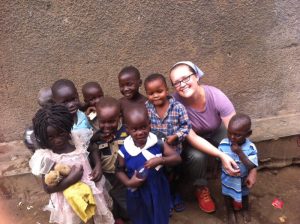 Well—we did it.
Well—we did it.We got on the plane.
After four months of playing some crazy game show of “Pack, Trash, Sell or Give?” with all our stuff ad nauseam, settling our respective work into trustworthy hands, and enough heartrending goodbyes that at the end my heart was twisted dry—we neatly quietly faithfully? closed the chapter of our lives that is Africa.
Well. Scratch that, too. Africa’s far too kneaded into us, far too braided into the fabric that is us. And the work continues in Uganda, even if at a distance for us.
I now find myself in that odd twilight that is having arrived, but my life still flayed open like a cardboard box. The pieces of me are finding niches, or seeking one, or temporarily cast aside, or still hiding out. I’m that inevitable bin at the end when you’re unpacking, where you dumped all the spare randomness. Where in the world should this go?
Transition can feel…bereft.
Uprooted

This week I giddily purchased some houseplants and, now that Uganda has spoiled me on fresh produce, some potted herbs (make sure you pronounce the “h”). They’re fragrant and green, and they make me happy. -Er. They make me happier. Thankfully, despite a few lank leaves and a handful blossoms I needed to tug from their stems, I think all of them will pull through. There’s a reason my basil came in a neat little peat pot. The wrapper says it can help avoid transplant shock.
Man. What I would give for a me-sized peat pot.
I love the (finally!) creative part of moving and crafting a prepared place. But when I’ve dug a little deeper in me, I’m still grappling with some fear. After a tight-knit community in Africa—will I find a friend in this small town? Having left two “jobs”—do I really have what it takes to freelance write full time, or am I about to perform an astounding career faceplant? My family seems so happy here. But will I be?
Maybe that’s why the words of Paul David Tripp smacked me between the eyeballs this morning.
In the life of the believer, fear of weakness amounts to God-forgetfulness. Timidity is a failure to remember the promises of the gospel.This felt personal because, amidst a transition I didn’t want, I’ve met an overwhelming amount of spiritual…bewilderment. My perspective of God altered considerably. I don’t think this is actually bad. I think it was actually more truthful, less a God of my graven image. One of the odd phrases rolling around my brain has been the words of a shocked Catherine Zeta-Jones in the movie Entrapment. She says to Sean Connery, who has just betrayed her, “Weren’t we partners?” Amidst the thrumming purpose and worship that was Africa for me, which pulled me in so tightly to God’s heart and His ceaseless labor for the poor, I felt suddenly…alone.
….God has promised to supply and empower; your job is to follow him by faith where you live every day. You don’t wait for the provision before you move. God has not promised that you will see it beforehand…you move forward in the certainty that he is with you, for you, and in you.
But here is what I know: Yes, we were partners. Yes, we still are. But ultimately, to cob a phrase from Tarzan: You, Potter. Me, Clay. God is not merely horizontal from me. He’s still vertical; still the holy, holy, holy from Isaiah 6 and Revelation. Which means He doesn’t fit it my box.
And yet, yes. He is still with me. For me. In me.
The Dwelling Place
Strapped in to the gray hum of a 757, bits of the prayer of St. Patrick fell from my brain. It hung in my dorm a couple of decades ago in college—and it’s great for times of transition, where fear seizes my heart in fists.Christ with me,I don’t know where this post finds you. I guess there’s a decent chance you’re in some form of transition, as constant as change appears. Maybe you, too, feel like your heart is tumbling around like a rogue sock in a clothes dryer.
Christ before me,
Christ behind me,
Christ in me,
Christ beneath me,
Christ above me,
Christ on my right,
Christ on my left,
Christ when I lie down,
Christ when I sit down,
Christ when I arise,
Christ in the heart of every man who thinks of me,
Christ in the mouth of everyone who speaks of me,
Christ in every eye that sees me,
Christ in every ear that hears me.
Back to the plants that are waving at me right now from my deck. There’s a gardener’s phrase about transition: First year sleep, second year creep, third year leap. I expect for them to be a bit unproductive this first year. I keep an eye out for these plants I purchased, watching for limp stems, and watering them pretty vigilantly. God doesn’t break a bruised reed, right? So it fits that this God–who prunes me, and who’s also harvesting behind where He and I leave–is tender in my transition. He’s patient for blossoms and fruit that will push forward when the season’s just right.
 Living here is an odd paradox of the most exhausting,
Living here is an odd paradox of the most exhausting, 














 It’s hard to complain about being 35 years old and having to bum gas money from a friend, when I have a car—and a cash source, once we get that pesky card issue straightened out. (
It’s hard to complain about being 35 years old and having to bum gas money from a friend, when I have a car—and a cash source, once we get that pesky card issue straightened out. (